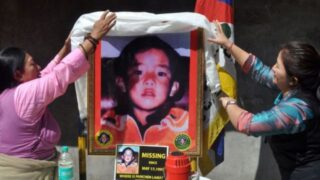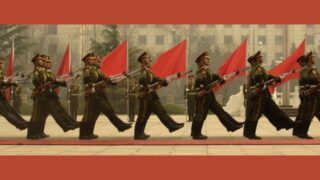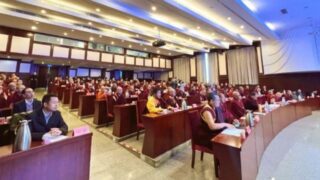Two confidential internal documents reveal how Beijing plans to control the reincarnation of the 14th Dalai Lama.
by Marco Respinti


As “Bitter Winter” has recently reported, the Dalai Lama, may announce he will not reincarnate, to save Tibetan Buddhism from the Chinese Communist Party (CCP)’s attempt to interfere with the whole reincarnation system. In fact, if the CCP succeed in its attempt, it will fundamentally twist Tibetan Buddhism and misuse religion to control the Tibetan people.
A new 30-page report on the subject confirms that possibility. It was released on October 4, 2022, at a side event of the 51st Session of the UN Human Rights Council, sponsored by the US, and co-sponsored by the UK, Canada, Czech Republic, and Lithuania. Entitled “Tibet, the Dalai Lama, and the Geopolitics of Reincarnation,” it is published by the International Tibet Network (ITN) and the Tibet Justice Center, an independent Tibet group and a member of the ITN, both coordinators of the Tibet Advocacy Coalition, which includes ITN, Students for a Free Tibet, Tibet Initiative Deutschland and Tibetan Youth Association Europe.
The report is based on two previously unseen and important CCP policy documents. These documents were “obtained by skilled Tibetan researchers with contacts in PRC,” the report states, and “reveal that the Chinese government is making elaborate preparations for what it describes as the ‘post Dalai era’, a Chinese term that has been adopted in order to convey China’s plans to capitalize on the passing of the Dalai Lama and to choose a successor.”
Researchers document how the Chinese regime is “accelerating the imposition of elaborate plans to compel compliance on the Tibetan Buddhist practice of reincarnation as His Holiness the 14th Dalai Lama ages,” pushing its strategy to co-opt also this aspect of Tibetan culture in its machinery of repression against human rights and freedom of belief in Tibet.
As the authors of the report explain, “Beijing’s struggle to appropriate and control matters at the heart of Tibetan religious identity emerges from an aim to secure total control in Tibet and to project its dominance beyond its borders. These political and religious forces set the stage for an intensifying geopolitical scenario linked to China’s elaborate plans to install a Communist-Party-endorsed figurehead as the next Dalai Lama and the possible impacts of this both in Tibet and outside the People’s Republic of China.”
The effect of this policy has worldwide importance, and may subvert a whole set of international relations. The CCP is in fact trying to exploit the inevitable passing of the father of Tibet as a historic opportunity to end international support for Tibet, and this forever.
“China’s ‘Sinicization’ of Tibetan Buddhism and its interference in the reincarnation system,” the report notes, “has far-reaching implications and seeks to finally break and reshape Tibetan identity. A Sinicized Tibetan Buddhism aims to break the deep connection of Tibetan people with the Dalai Lama and involves a dystopian system of high-tech surveillance and policing of monasteries and nunneries. Thousands of monks and nuns have been expelled from religious institutes, and some subjected to extreme ‘patriotic’ ‘re-education’ campaigns that have involved torture and sexual abuse.”
Since “China sees religious belief as one of its most significant problems in Tibet, which has been confounded by its failure to draw Tibetans away from their deeply-rooted spiritual practice and religious beliefs, in particular their allegiance to the Dalai Lama,” it tries to distort the reincarnation system through “the notion of ‘stability maintenance’ (weiwen).” This promotes “achieving ‘long-term stability’ as a political euphemism to crush dissent or moderate opinions that counter the CCP, and ensuring compliance to the Party state.”


In fact, “the reincarnation of Tibetan religious leaders and particularly the succession of the Dalai Lama are described by officials as ‘major political struggles’ for ‘stability maintenance.’ In April 2020, Liu Zhiqiang, deputy secretary of the Party Committee in Lhoka City, U-Tsang (Chinese: Shannan, Tibet Autonomous Region), ordered a ‘focus on dealing with the major political struggles of the 14th Dalai Lama’s death and reincarnation’ in order to ‘maintain stability.’”
This “reveal an ominous strategy designed to appropriate and control matters at the heart of Tibetan religious identity and target not only the Tibetan people but also the broader international community” as a means to “secure authority in Tibet and build influence across the Tibetan Buddhist world.”
One of the papers “states that the Dalai Lama’s passing presents China with an opportunity to
‘escape its passive situation in communicating on Tibet,’ and a later paper from 2017 states that the reincarnation issue ‘will be unavoidable but should also be seen as an opportunity.’ Both papers
raise the need for the CCP to build a public relations strategy focused around training China’s Panchen
Lama to replace the ‘vanished idol’ (Gedhun Choekyi Nyima who was chosen by the Dalai Lama as the 11th Panchen Lama and was disappeared in 1995) […] and to use the situation to strengthen China’s position internationally beginning a ‘new era’ of control over Tibet.”
And “[t]he possibility of violence in Tibet when the Dalai Lama passes is also raised; however, this analysis ignores the reality that an outbreak of violence would likely be the result of China’s interference in the selection process and oppressive measures against Buddhism Tibetans overwhelmingly follow the Dalai Lama’s position on non-violence despite decades of harsh political crackdowns that criminalize even the mildest expression of loyalty to the exiled spiritual leader.”
At the launching event on October 4, introductory remarks were given by US Special Coordinator for Tibetan Issues, Uzra Zeya, the United Kingdom’s Special Envoy for Freedom of Religion or Belief, Fiona Bruce, and US Ambassador to the UN Human Rights Council, Michele Taylor, followed by a panel discussion.
Gloria Montgomery of Tibet Justice Center said “China sees this as an end game for Tibet, believing that by imposing their own Dalai Lama candidate they will have completed their ‘Sinicization’ plans, and will be a step closer to controlling Tibet and reshaping the Tibetan identity. The international community must urgently take a strong stand against Beijing’s ruthless attack on Tibetans’ right to freedom of religion. Tibetan authority over their own religious practices must be preserved at all costs.”
The Co-Chair of International Tibet Network, Lhadon Tethong, added: “China’s interference in His Holiness the Dalai Lama’s succession has far-reaching, global implications. Governments’ careful consideration and engagement with the key recommendations in this report could not be more vital.”









